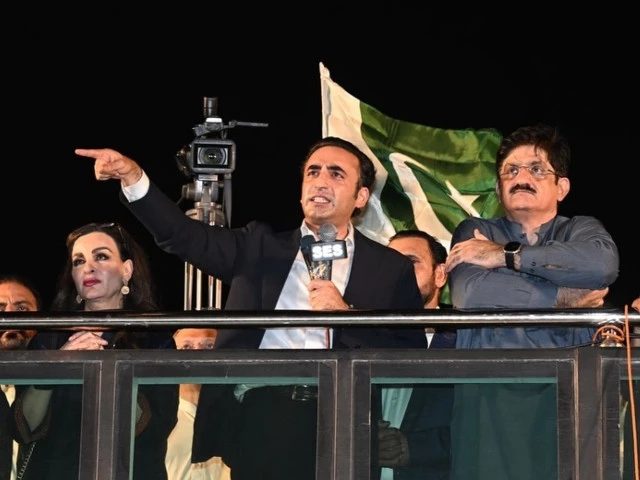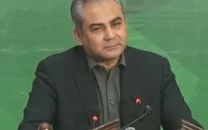India failed both militarily and diplomatically against Pakistan: Bilawal
India must abide by international law and IWT or face another war, then all six rivers will be ours, says PPP chairman

Pakistan Peoples Party (PPP) Chairman Bilawal Bhutto Zardari asserted that after suffering a humiliating defeat on the battlefield, India also failed in its diplomatic campaign against Pakistan abroad, while Islamabad’s narrative prevailed on the international stage.
Bilawal led a delegation to United States and Europe, appointed by Prime Minister Shehbaz Sharif, to present Islamabad’s perspective on the recent conflict with India.
The visit aimed to secure international support, especially from the European Union, to help prevent further escalation between the two nuclear-armed neighbours.
“میں اس دورے کے دوران پاکستان کا امن کا پیغام، کشمیر کا پیغام، سندھو کا پیغام اور دہشتگردی کے متعلق ہمارا موقف اقوام متحدہ، امریکہ، برطانیہ اور یورپی یونین کے سامنے لے کر گیا۔ بھارت کوشش کر رہا تھا کہ وہ جنگ کے میدان میں تو ہم سے جیت نہیں سکا تو بیانیہ کی جنگ اور سفارتی سطح پر… pic.twitter.com/CwWus38nB8
— PPP (@MediaCellPPP) June 20, 2025
Speaking after returning from the successful tour in Karachi following a warm welcome on Friday, Bilawal emphasised the delegation’s efforts in conveying Pakistan’s message on peace, Kashmir, the Indus Waters Treaty, and counter-terrorism during visits to New York, Washington DC, London, and Brussels.
He noted that during the conflict with India, although the former was “seven times larger”, Pakistan’s armed forces achieved a “humiliating defeat” for their adversary — a feat he said filled the country with pride.
PPP chairman said Islamabad had overcome India’s efforts to undermine it at the diplomatic level, adding that the country won the diplomatic battle through tireless efforts.
"India tried to succeed where it failed on the battlefield — by defeating Pakistan on the narrative and diplomatic fronts — but I want to tell you that even on that front, Pakistan emerged victorious and India failed."
Read More: 'No military solution to Pak-India disputes'
He asserted that Pakistan stood on the side of truth, while India relied on falsehood — a contrast that, he said, was evident in the international media, where Pakistan’s narrative gained traction and India’s failed to resonate.
Recalling the last month’s skirmish with neighboring country, he said that Pakistan’s armed forces had shot down six Indian jets — a denial initially issued by India, but later conceded a month later.
Highlighting that Kashmir has remained Pakistan’s most important issue since partition, he stressed that Pakistan raised its voice for Kashmir everywhere.
“Before the war, India’s stance was that Kashmir was a bilateral matter. Now they must recognise that it is no longer an internal issue but an international one.”
پاکستان پیپلزپارٹی کے چیئرمین بلاول بھٹو زرداری امریکہ، برطانیہ اور یورپی یونین کے کامیاب سفارتی دورہ کے بعد وطن واپسی کے موقع پر استقبال کیلئے آئے شرکاء کے پرجوش نعروں کا خیرمقدم کررہے ہیں۔@BBhuttoZardari
— PPP (@MediaCellPPP) June 20, 2025
#ProudOfBilawal pic.twitter.com/aRDNbowES1
He also referred to US President Donald Trump’s comments, saying the US was prepared to facilitate talks between Pakistan and India to resolve the Kashmir dispute — a “historic success,” he said.
Turning to Pakistan’s water security, he warned that Indian Prime Minister Narendra Modi’s threat to restrict the flow of the River Indus — described as an unprecedented move — would not go unchallenged.
“When it comes to the Indus, the PPP will lead the charge, whether domestically or internationally,” he said.
“بھارت کو سندھ طاس معاہدے کو ماننا پڑے گا، جس کے تحت چھ میں سے تین دریا پاکستان کے ہیں اور باقی بھارت کے حوالے ہیں، بھارت کے پاس دو آپشنز ہیں یا تو وہ عالمی قوانین کو تسلیم کرتے ہوئے سندھ طاس معاہدے پر عمل کرے اور اگر وہ ایسا نہیں کرتا تو پاکستان ایک اور جنگ کرئے گا اور پھر یہ چھ… pic.twitter.com/ngVxhoJZzN
— PPP (@MediaCellPPP) June 20, 2025
He issued a stern warning to India: “You have two options: either abide by international law and the Indus Waters Treaty, which allocates three rivers to Pakistan and three to India, or face another war — and all six rivers will be ours.”
Bilawal also questioned why domestic political actors, whom he blamed for inciting hate and division, were silent in the face of India’s water threat, insisting that these politicians had long been funded by India and accused them of raising sectarian slogans in Balochistan and Sindh.
“The people of Sindh will never forgive these political orphans for their silence today,” he added, referring to their apparent inaction over the river threats and water security concerns.





















COMMENTS
Comments are moderated and generally will be posted if they are on-topic and not abusive.
For more information, please see our Comments FAQ